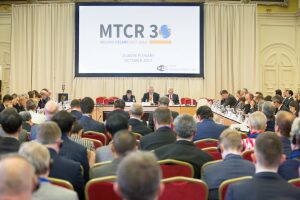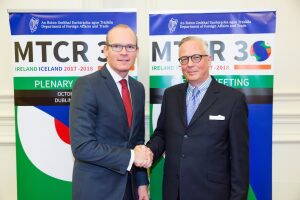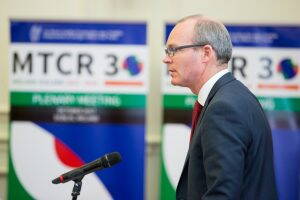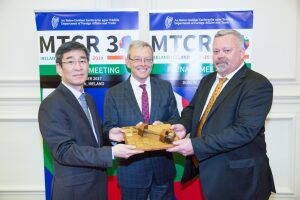 Missile Technology Control Regime
Missile Technology Control Regime
Last month (October 2017) more than 250 experts from 35 countries met at the Royal Hospital Kilmainham in Dublin for the 31st Plenary Meeting of the Missile Technology Control Regime (MTCR). The Plenary marked the beginning of Ireland and Iceland’s Co-Chairmanship of the regime, which will last until the next Plenary meeting scheduled for 2018.
Five days of planned meetings were condensed into four days when severe storm conditions across Ireland on Monday October 16th meant that the first day of meetings had to be cancelled.
However, thanks to the flexibility and diligence of the chairpersons of the meetings, and the participants themselves, the shortened MTCR Plenary week remained a productive forum for discussion on a wide range of issues related to missile proliferation.
On Tuesday and Wednesday, technical expert groups met to exchange information on proliferation trends and procurement strategies used by proliferators, technology trends in missile programmes and efforts to exploit export controls.



On Wednesday afternoon (October 18th), the Minister for Foreign Affairs and Trade, Simon Coveney T.D formally opened the 31st Plenary Meeting of the Missile Technology Control Regime (MTCR) alongside the Icelandic Permanent Secretary of State, Mr Sturla Sigurjónsson.
In his remarks Minister Coveney stated:
“Ireland is very proud to partner with our Icelandic counterparts and assume the role of Co-Chair for the 2017-18 Session of the MTCR… together with our Icelandic partners, we are showing ourselves ready to meet our obligations to promote non-proliferation by co-chairing the MTCR”
“In the 30 years since its formation, the MTCR has proven its worth. It has now expanded to encompass 35 partners, partners who are united in a common purpose. The spirit of cooperation has always been a feature of this regime and it is a feature that is now more than ever needed if we are to ensure our success and to continue to lead the way in terms of missile non-proliferation.”
Mr Sigurjonsson, in his remarks, highlighted the need for the MTCR to remain relevant in the face of a rapidly changing security environment, and fast-paced technological advancements.
“We as MTCR partners have a responsibility to adapt to emerging threats to our security with technical expertise, flexibility, political judgement. … We will also work to ensure that the MTCR retains its efficacy in the face of ever-evolving technical and security developments.”
Following these statements, the Outgoing Chair of the Regime, Director General Ham Sang-wook handed over the gavel to the Incoming Co-Chairs – Ambassador Breifne O’Reilly from the Department of Foreign Affairs and Trade in Ireland and Minister Counsellor Bjarni Vestmann from the Ministry of Foreign Affairs of Iceland.
Over the course of the Plenary meeting delegations discussed a variety of issues including the challenges posed by Intangible Technology Transfer, Unmanned Aerial Vehicles and Regional Proliferation.
On Friday afternoon, all 35 MTCR Partners agreed a joint Public Statement by consensus, the full text of which can be found here. The Statement reiterates the regime’s commitment to limit the risks of missile proliferation by controlling international transfers than can contribute to delivery systems that can be used for Weapons of Mass Destruction.
